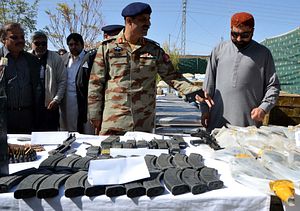On May 29, dozens of heavily armed gunmen, wearing the uniforms of security forces, intercepted two buses in Balochistan carrying local Pashtun from Pishin to Karachi. After forcing the passengers off the buses, the gunmen shot and killed 22.
The assault occurred in a town in Balochistan’s Mastung district, which lies around 40 km south of Quetta, the provincial capital of Balochistan.
“After searching and identifying them, the passengers were taken away to nearby mountains, where they were killed,” an eye witness said. “When the buses came to a screeching halt, the armed men forced their way on board.” Balochistan’s Home Minister Mir Sarfaraz Bugti confirmed that the attackers were wearing the uniforms of security forces.
The outlawed United Baloch Army (UBA) claimed responsibility for the attack.
“Last year, the outlawed United Baloch Army also claimed responsibility for two terror attacks, the April 9 bomb blast in Islamabad’s fruit market, which killed at least 25 workers, and an attack the next day at a railway station in Balochistan’s Sibi district, in which 15 people lost their lives,” said a Quetta based analyst, who did not wish to be named. “After these two attacks, the group became more prominent.”
According to reports, security forces launched an operation against the attackers, and freed five passengers who had been taken hostage. According to government officials, the federal government provided two helicopters for the operation. Some 200 troops took part, and security forces claim to have killed five attackers. The kidnappers spared the drivers and conductors of the buses, who in turn informed the authorities.
On the day after the attack, relatives of the victims protested outside Governor House, demanding strict action against the perpetrators. The protest ended when the chief minister of Balochistan, Dr. Abdul Malik Baloch accepted their demands.
“The attack is a deliberate attempt to fuel hatred between Baloch and Pastun, who have been living together as brothers for centuries,” said Baloch.
Baloch also spoke with Prime Minister Nawaz Sharif, who called on the chief minister to tighten security and arrest the killers. They agreed to hold an All Parties Conference on the security situation in Balochistan in the wake of the attack.
Qazi Abdul Hameed, an intellectual based in Quetta, says that there has traditionally been no conflict between Baloch and Pashtun. Indeed, they have together struggled for their rights within Pakistan.
However, Balochistan, which borders Afghanistan and Iran, has been in the grip of a low-level insurgency since the middle of the last decade. The Baloch insurgents demand greater autonomy and a greater share of the natural resources there. The region has also turned into a flashpoint, with the Hazara community of Pakistan targeted by sectarian outfits. Pakistan’s intelligence agencies often blame India, with its growing diplomatic presence in Afghanistan, for fuelling unrest in the province. India has denied the accusations.
Soon after the Mastung attack, the home minister pointed to the possible involvement of the Indian intelligence community. But independent political observers say the attack was more likely designed to destabilize the China-Pakistan Economic Corridor – an effort to pit Baloch and Pashtun against each other in the province. “The attack on Pashtun passengers has been planned to sabotage the corridor,” says Zahoor Buledi, a former provincial minister in the Balochistan Assembly.
“Mastung carnage is not the outcome of so-called rivalry between Baloch and Pashtun ethnic groups, as ethnic ties have never been so harmonious,” says Jan Achakzai, a commentator and political advisor. “For the first time in three decades, both Baloch and Pashtun nationalists are in the provincial government, which has bridged the ethnic fault line.”
On the other hand, Buledi decries the helplessness of the provincial government, which he says has failed to respond to the expectations of the people of Balochistan. This is encouraging the attacks, he says.
In the past, sectarian elements have attacked Shia pilgrims in Mastung district after checking their identity cards. Now Pashtuns have been targeted using the same approach. Sajid Hussain, formerly an assistant editor of The News International notes that the national identity card has become a threat to almost any minority, ethnicity or religious group in Pakistan.
Achakzai thinks that compared with its peak in 2009, the Baloch insurgency has weakened considerably. What activity that does take place is largely due to bad governance. The government of Balochistan must improve security governance, he says, as 70 percent of it lacks any police presence. Limiting the police to a few cities leaves the region unable to combat terrorism.
The author is a columnist at the Daily Times. Visit his blog or follow him on Twitter @Akbar_notezai. He can be reached at [email protected].

































